‘They won’t, they won’t!’: Patrushev convinces dairy producers to keep butter price?
Butter prices have been put on pause: government finds measures to restrain rise in price
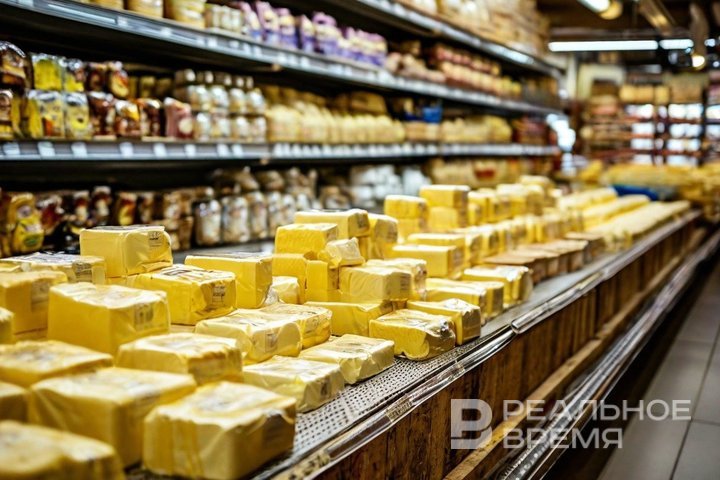
Tatarstan dairy producers are to sign contracts for the sale of butter with retail chains again by November 1. Before that, two major players — Kazan Dairy Plant and Zelenodolsk Dairy Plant — raised prices twice since the beginning of autumn, after which butter soared in price by 30%, and brands — by 50%, as well as throughout the country. Against this background, at the end of October Russian Deputy Prime Minister Dmitry Patrushev instructed to increase butter imports, and instructed the Federal Antimonopoly Service to control prices on store shelves. “Now they won't, they won't grow anymore," Alexander Yemshanov, the owner of Uva-Moloko, assured Realnoe Vremya. But time will tell what price tags will appear in November.
“Everyone clearly understood what to do”
Tatarstan producers have agreed to stop further price increases for dairy products, and above all for the increased price of butter. “They will not, they will not grow any more," Alexander Yemshanov, the owner of Uva-Moloko, told Realnoe Vremya (it works under Milkovo, Barakatle and Molochnaya Familia brands). “You can clearly say: everything will be fine! Prices have stabilised, volumes are there, there is no reason to panic anymore.” The possibility of curbing price increases with other milk processors, which account for more than half of sales of dairy products in Kazan, is being discussed.
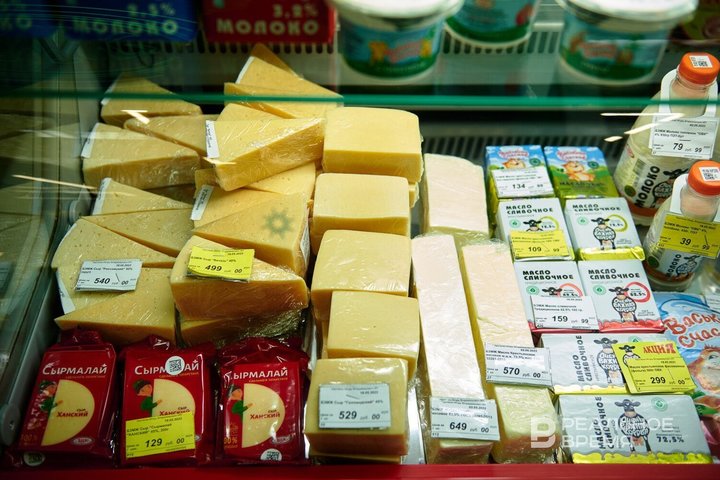
Agrosila has not reduced and does not plan to reduce the supply of butter to retail chains, the company told Realnoe Vremya. “This is not a special case," Svetlana Barsukova, the head of the holding company, answered the call from Realnoe Vremya.
For 9 months of this year, Agrosila-Moloko PLC, which is part of the holding, produced 621 tonnes of butter. Compared to the same period last year, production increased by 19%. As of October 22, the company's butter reserves amount to 67 tonnes. “Agrosila-Milk PLC does not face a shortage of raw materials for production, since the bulk of milk comes from the holding's own agricultural firms," the company explained. “The increase in butter prices is primarily due to the increase in production costs.”
Dairy producers, under various pretexts, seek to avoid comments on this issue, referring to the fact that “this is more of a political subject”.
“On Wednesday, there was a meeting with Russian Deputy Prime Minister Dmitry Patrushev. Everyone clearly understood what to do on it, it seems to me," Alexey Fatykhov, the co-founder and director of Azbuka Syra company, explained to Realnoe Vremya (it works on the basis of former VAMIN assets in the Arsky district). In his opinion, after Patrushev's statements addressed to all participants in the food market, there is nothing more to comment on. “So I don't understand what else to comment on," he replied.
How much butter prices soared in Kazan
Retail prices for butter began to accelerate as autumn approached. As Realnoe Vremya reported, From September 1, the largest retail chains revised the purchase prices for dairy products with a high content of milk fat (butter, cream, sour cream, yoghurts, cheeses), as a result of which retail prices have increased from 10% to 30%. Butter with a fat content of 72.5% rose the most — a briquette weighing 180 grams approached 200 rubles instead of the previous 119 rubles.
According to representatives of retail chains, two major players, Kazan Dairy Plant (part of KOMOS Group of Companies) and Zelenodolsk Dairy Plant (part of Ak Bars Holding), have raised prices for butter with a fat content of 72.5% twice since the beginning of autumn. “First, we received a notification of an increase in purchase prices from September 1 by 10-15%, then another one from October 1. As a result, the price of butter has increased by 30%," said one of the interlocutors of Realnoe Vremya. Due to the constant revision of prices, some manufacturers have switched to short-term contracts — for a period of one to two months, after which prices change.
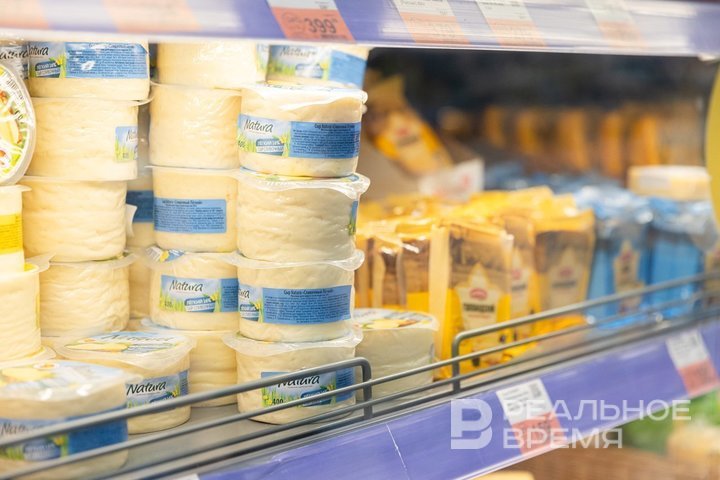
The maximum increase was felt by retail chains for brands. According to a representative of the Kazan network, the supplier has notified about the upcoming increase of almost 50%. “Then we abandoned this product and replaced it with Elmai budget butter (produced at the Vysokogorsky Dairy Plant)," said the representative of the Kazan retail chain. In his opinion, it is impractical to sell a pack of butter at a price of 250 rubles, since Kazan buyers will stop buying such an expensive product and will look for a cheap replacement. Thanks to this, the chain retained the presence of butter on the shelf, as other manufacturers put comparable purchase prices.
“The reasons for the increase in prices for butter lie on the side of producers — since the beginning of the year, purchase prices for it have increased several times, by a total of more than 31%," Igor Karavaev, the chairman of ACORT, told Realnoe Vremya.
According to him, in September, the purchase price of butter for retail chains increased by 8%.
At the same time, the representative of a small Kazan retail chain said that manufacturers are pursuing an electoral policy. For example, one of the major competing chains sells butter for almost the entire month at a reduced price equivalent to the selling price. “It is unclear where they got such a price. They say they're selling leftovers that have accumulated since the beginning of the year. But I can't believe it," he says.
“Like with chicken eggs”: why butter prices have “jumped”
Milk processors have been pushing for higher prices since May, when they themselves raised the purchase prices for raw milk. But it was not possible to quickly reach an agreement with federal retail chains. As a result, the first small price adjustment on the shelf occurred in the summer, but turned out to be unnoticeable to buyers. “Not all networks make decisions quickly, and besides, it is a social product. It takes more time to justify the cost increase," the top manager of a large dairy holding told Realnoe Vremya.
And then there was 'a fight'. If the retail chain did not accept offers to raise the price, then the manufacturer stopped shipping butter, and the chain risked being left with empty shelves. Of course, there is no question of any shortage of butter. If it is not on sale, it means that the retailer has not agreed with the supplier on the terms of sale, or rather, could not divide the margin from the increased price. So, Rusprodsoyuz believes that retail chains sell butter with a margin of 70%. But ACORT put blame on manufacturers. “Retail butter prices are growing slower than purchase prices, since retail chains do not shift the entire volume of price increases onto the shoulders of consumers, but stretch it over time, avoiding a sharp increase in prices," ACORT reported.
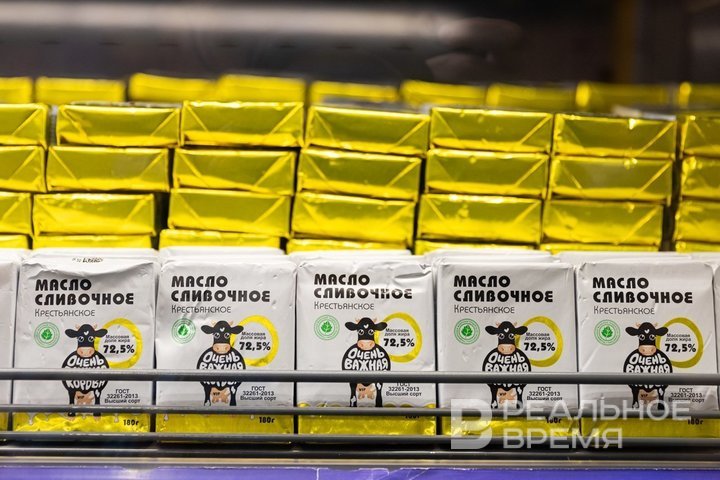
Suppliers negotiated with the networks in different ways. “Enterprises cannot operate at a loss. Retail chains, as the end seller, always try to restrain. They are less interested in how much milk we buy and what is the profitability. They can only be indignant: “Here you have prices rising again!," said the top manager of one of the processors. Then he predicted further price increases until the end of 2024. At that time, the pack of butter had grown to 190 rubles, or exceeded almost a thousand rubles per kilogram. This is more expensive than a kilogram of beef, which has not happened before.
The minister of agriculture and food of the Republic of Tatarstan, Marat Zyabbarov, considers the increase in milk prices justified. “There is an increase in the price situation, and this is primarily due to an increase in the cost of production. To date, the average price for agricultural organisations is 38.00 rubles / kg, which is by 30.49% higher compared to the same period in 2023 (29.12 rubles)," he told reporters on Saturday at the opening of the agricultural fair in the agro-industrial park Kazan.
ACORT claims that Tatarstan has the lowest butter prices. “The average shelf price of butter of the “first price” in large retail chains — members of ACORT was 866 rubles per kilogram. Tatarstan is among the top 10 regions with the lowest growth rates of butter prices, according to Rosstat data: the average retail price of butter in Tatarstan is 877.8 rubles per kilogram. In the whole country, according to the same data, a kilogram of butter costs 1,056 rubles per kilogram.”
Patrushev will “smear” prices with imports, and FAS — with a stick
The federal ministry of agriculture reacted to the price increase with extreme measures. Last week, Dmitry Patrushev gathered major butter producers and retailers in Moscow and announced that “imports from several countries have been activated” to stabilise prices. But he asked to continue to increase production in the country. “The dairy industry is a socially significant area of the agro-industrial complex," Dmitry Patrushev said, recalling that the state provides state support to producers.
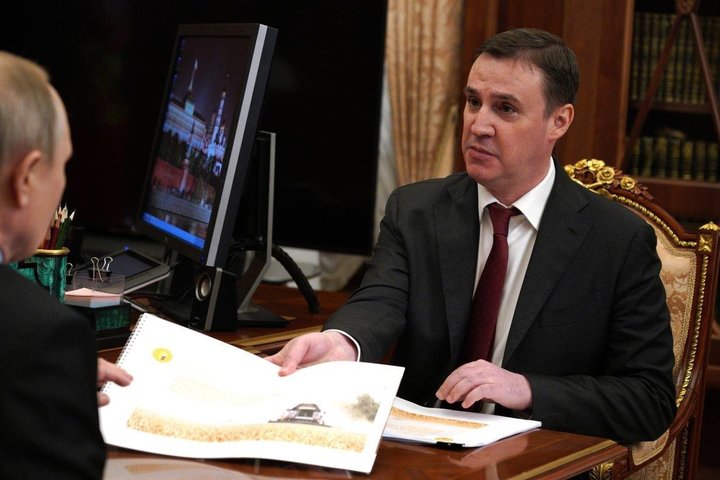
At the same time, the federal authorities connected administrative resources. The FAS was instructed to control the prices of butter. Now the manufacturer is obliged to notify the territorial services of the Federal Antimonopoly Service of the upcoming price increase by the end of 2024. “In order to monitor prices for certain types of socially important goods, the FAS of Russia has sent requests to the largest producers of butter. Organiыations must provide the service with information on each planned increase in selling prices for these products by the end of 2024," the press service of the Federal Antimonopoly Service of the Republic of Tatarstan told Realnoe Vremya.
For what? As the department explained, based on the data provided, the service will analyse the validity of the increase in wholesale and selling prices. In case of detection of unjustified price increases, the FAS of Russia will apply antitrust response measures. In addition, the FAS of Russia is working on concluding agreements at the regional level by the executive authorities of the subjects of the Russian Federation with business entities in accordance with the procedure provided for by Decree of the Government of the Russian Federation No. 662 dated 26 April, 2023.
Now some Tatarstan dairy producers are preparing to re-sign new contracts for the sale of butter, so that Patrushev prices will appear on shelves in November, network operators say.
Later, Minister of Agriculture and Food of the Republic of Tatarstan Marat Zyabbarov gave a more detailed comment on the situation:
“Today, the situation with the availability of butter in warehouses and store shelves is stable. All enterprises are operating normally, the market is fully supplied with butter.”
In Tatarstan, a wide range of butter is presented in all stores, there are no prerequisites for a commodity shortage.
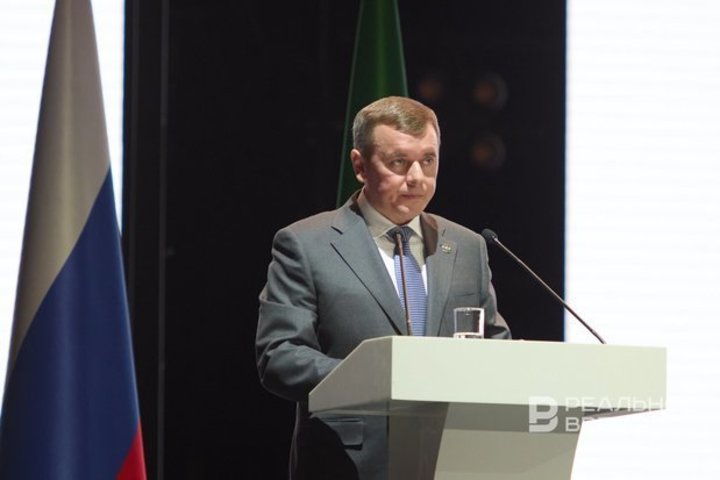
In 8 months of 2024, 1 million 537,900 tons of milk were produced in all categories of farms, which is by 59,600 tons (+104%) more than in the same period last year. During the same period, butter production reached 14,335.3 tonnes, while consumption amounted to 9,733.333 tonnes. The rest of the butter is sold outside the republic. This indicates that there are no prerequisites for a shortage of both raw materials and final products in the form of butter.
Today, large enterprises of the republic maintain their production volume, and some even increase them. Almetyevsk Dairy Plant increased production by 18.2% in nine months, Alabuga Sote increased production by 4%, the output volumes of ZMK JSC, Agrosila JSC, Elmai VMC and Faiza SHPSSK remained at the same level.
There is an increase in the price situation, and this is primarily due to an increase in the cost of production. To date, the average price for agricultural organisations is 38.00 rubles/kg, which is by 30.49% higher compared to the same period in 2023 (29.12 rubles).
It should be noted that in the structure of butter production cost, the main place is occupied by raw materials — raw milk, therefore, an increase in prices for it directly affects the cost of final product.
In turn, the cost of production of 1 kg of milk has reached 30 rubles today. Expenses related to the provision of feed, premixes, feed additives and biological protection of enterprises have increased. Dairy producers, as well as processors, note an increase in costs associated with wages, an increase in the key rate to 21%, logistical costs, as well as an increase in energy prices.”